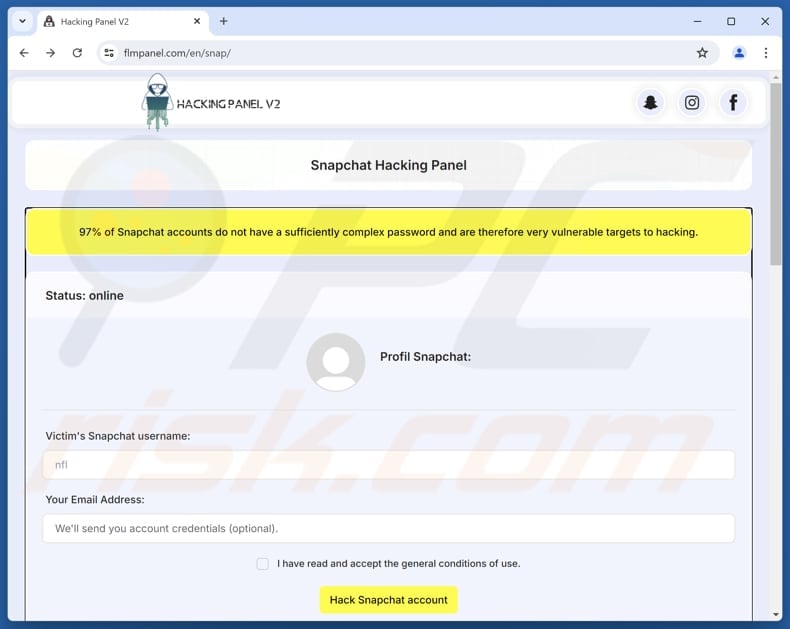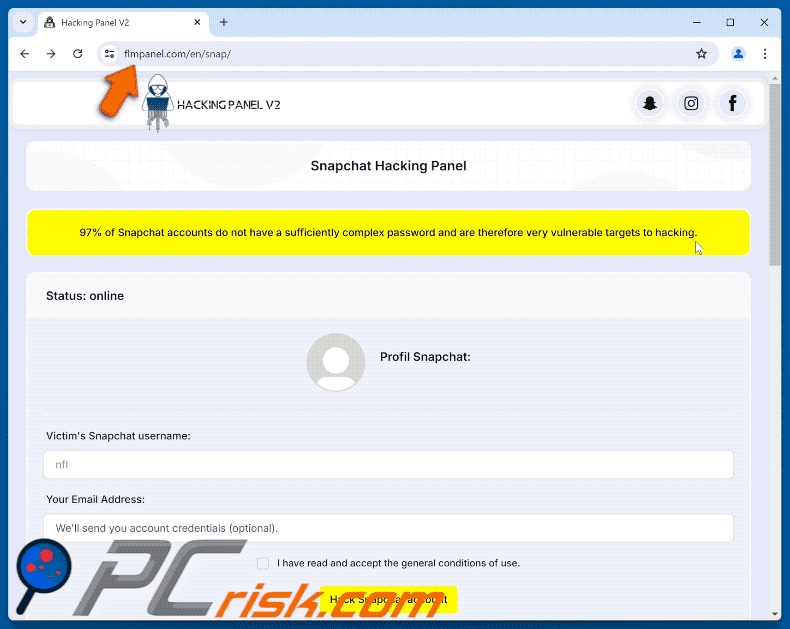How to avoid fake sites like "Snapchat Account Hack"
Phishing/ScamAlso Known As: Fake Snapchat account hacking tool
Get free scan and check if your device is infected.
Remove it nowTo use full-featured product, you have to purchase a license for Combo Cleaner. Seven days free trial available. Combo Cleaner is owned and operated by RCS LT, the parent company of PCRisk.com.
What kind of scam is "Snapchat Account Hack"?
Our investigation shows that this scam website pretends to provide a "Hacking Panel V2" tool for breaking into Snapchat accounts. In truth, it simply redirects users to another site. Interacting with such deceptive schemes poses risks and should be avoided. If users land on a page like this, they should close it immediately.

"Snapchat Account Hack" scam in detail
The fraudulent site prompts users to input the target's Snapchat username, suggesting it can hack the account. After submission, it displays a fake process that mimics code injection and anonymous session configuration. The site then falsely claims it can reveal the account's password.
Finally, the user is notified that they are on a trial version and urged to purchase full access to a Snapchat hacking panel. The site provides an affiliate link, which, during our review, redirected to a subscription page for mSpy — a legitimate parental monitoring and device tracking software.
The individual running the scam likely earns money whenever someone makes a purchase or registers through that link. This website might also be used to trick users into opening phishing pages or other misleading sites designed to capture login credentials or deceive users into transferring money to scammers.
It is highly advisable to steer clear of such sites and refrain from disclosing any personal data or following their prompts.
| Name | Fake Snapchat account hacking tool |
| Threat Type | Scam, Social Engineering, Fraud |
| Fake Claim | Users can hack Facebook accounts |
| Related Domain | flmpanel[.]com |
| Detection Names | Combo Cleaner (Phishing), Ermes (Not Recommended), Fortinet (Spam), G-Data (Phishing), Full List Of Detections (VirusTotal) |
| Symptoms | Unofficial domain, illegal offer, redirects to other websites |
| Distribution methods | Compromised websites, rogue online pop-up ads, fraudulent emails, unwanted applications. |
| Damage | Loss of sensitive private information, monetary loss, identity theft, possible malware infections. |
| Malware Removal (Windows) |
To eliminate possible malware infections, scan your computer with legitimate antivirus software. Our security researchers recommend using Combo Cleaner. Download Combo CleanerTo use full-featured product, you have to purchase a license for Combo Cleaner. 7 days free trial available. Combo Cleaner is owned and operated by RCS LT, the parent company of PCRisk.com. |
Conclusion
The examined website is a scam that claims to offer Snapchat account hacking services. While the other sites opened through the scam may be legitimate, the scam uses misleading tactics to generate affiliate commissions. Overall, users are strongly advised to avoid interacting with such platforms, especially when they offer illegal services.
How did I open a scam website?
Scam websites can be reached through different channels. These include links or attachments in phishing emails or social media messages, and misleading ads placed on questionable websites. Unreliable sites may also be encountered through notifications from untrustworthy websites or ads delivered by adware.
In other cases, users are redirected to scam pages while browsing torrent platforms, illegal streaming sites, or other pages that rely on rogue ad networks.
How to avoid visiting scam pages?
Avoid interacting with pop-ups, ads, or suspicious links found on untrustworthy websites, and never grant notification permissions to such pages. Be cautious with unexpected emails or social media messages, especially those from unknown people or addresses - refrain from opening attached files or clicking on links in such emails/messages.
Download apps exclusively from reliable sources like official websites or trusted app stores. It is also essential to keep your operating system and applications up to date, use a reputable antivirus or anti-malware tool, and perform routine scans to detect potential threats. If your computer is already infected with unwanted apps, we recommend running a scan with Combo Cleaner Antivirus for Windows to automatically eliminate them.
The appearance of "Snapchat Account Hack" scam (GIF):

Instant automatic malware removal:
Manual threat removal might be a lengthy and complicated process that requires advanced IT skills. Combo Cleaner is a professional automatic malware removal tool that is recommended to get rid of malware. Download it by clicking the button below:
DOWNLOAD Combo CleanerBy downloading any software listed on this website you agree to our Privacy Policy and Terms of Use. To use full-featured product, you have to purchase a license for Combo Cleaner. 7 days free trial available. Combo Cleaner is owned and operated by RCS LT, the parent company of PCRisk.com.
Quick menu:
- What is Fake Snapchat account hacking tool?
- How to identify a pop-up scam?
- How do pop-up scams work?
- How to remove fake pop-ups?
- How to prevent fake pop-ups?
- What to do if you fell for a pop-up scam?
How to identify a pop-up scam?
Pop-up windows with various fake messages are a common type of lures cybercriminals use. They collect sensitive personal data, trick Internet users into calling fake tech support numbers, subscribe to useless online services, invest in shady cryptocurrency schemes, etc.
While in the majority of cases these pop-ups don't infect users' devices with malware, they can cause direct monetary loss or could result in identity theft.
Cybercriminals strive to create their rogue pop-up windows to look trustworthy, however, scams typically have the following characteristics:
- Spelling mistakes and non-professional images - Closely inspect the information displayed in a pop-up. Spelling mistakes and unprofessional images could be a sign of a scam.
- Sense of urgency - Countdown timer with a couple of minutes on it, asking you to enter your personal information or subscribe to some online service.
- Statements that you won something - If you haven't participated in a lottery, online competition, etc., and you see a pop-up window stating that you won.
- Computer or mobile device scan - A pop-up window that scans your device and informs of detected issues - is undoubtedly a scam; webpages cannot perform such actions.
- Exclusivity - Pop-up windows stating that only you are given secret access to a financial scheme that can quickly make you rich.
Example of a pop-up scam:

How do pop-up scams work?
Cybercriminals and deceptive marketers usually use various advertising networks, search engine poisoning techniques, and shady websites to generate traffic to their pop-ups. Users land on their online lures after clicking on fake download buttons, using a torrent website, or simply clicking on an Internet search engine result.
Based on users' location and device information, they are presented with a scam pop-up. Lures presented in such pop-ups range from get-rich-quick schemes to fake virus scans.
How to remove fake pop-ups?
In most cases, pop-up scams do not infect users' devices with malware. If you encountered a scam pop-up, simply closing it should be enough. In some cases scam, pop-ups may be hard to close; in such cases - close your Internet browser and restart it.
In extremely rare cases, you might need to reset your Internet browser. For this, use our instructions explaining how to reset Internet browser settings.
How to prevent fake pop-ups?
To prevent seeing pop-up scams, you should visit only reputable websites. Torrent, Crack, free online movie streaming, YouTube video download, and other websites of similar reputation commonly redirect Internet users to pop-up scams.
To minimize the risk of encountering pop-up scams, you should keep your Internet browsers up-to-date and use reputable anti-malware application. For this purpose, we recommend Combo Cleaner Antivirus for Windows.
What to do if you fell for a pop-up scam?
This depends on the type of scam that you fell for. Most commonly, pop-up scams try to trick users into sending money, giving away personal information, or giving access to one's device.
- If you sent money to scammers: You should contact your financial institution and explain that you were scammed. If informed promptly, there's a chance to get your money back.
- If you gave away your personal information: You should change your passwords and enable two-factor authentication in all online services that you use. Visit Federal Trade Commission to report identity theft and get personalized recovery steps.
- If you let scammers connect to your device: You should scan your computer with reputable anti-malware (we recommend Combo Cleaner Antivirus for Windows) - cyber criminals could have planted trojans, keyloggers, and other malware, don't use your computer until removing possible threats.
- Help other Internet users: report Internet scams to Federal Trade Commission.
Frequently Asked Questions (FAQ)
What is a scam website?
Typically, such a site is designed to deceive visitors into taking actions that benefit cybercriminals. These fraudulent pages often imitate legitimate websites to trick users into trusting and engaging with them.
What is the purpose of a scam website?
These websites are usually designed to trick users into disclosing information (such as account credentials or credit card details), sending money to fraudsters (e.g., paying for fake services), installing harmful or unwanted programs, or performing other actions.
Why do I encounter scam websites?
Scam websites are accessed through various channels, including phishing emails, social media messages, misleading ads, and notifications from unreliable sites. Users can also be redirected to these pages while browsing torrent platforms, illegal streaming sites, or other pages using rogue ad networks.
Will Combo Cleaner protect me from pop-up scams?
Combo Cleaner scans every website you visit and identifies potential threats, including scam sites. If a dangerous site is detected, it immediately alerts you and blocks access to protect your device.
Share:

Tomas Meskauskas
Expert security researcher, professional malware analyst
I am passionate about computer security and technology. I have an experience of over 10 years working in various companies related to computer technical issue solving and Internet security. I have been working as an author and editor for pcrisk.com since 2010. Follow me on Twitter and LinkedIn to stay informed about the latest online security threats.
PCrisk security portal is brought by a company RCS LT.
Joined forces of security researchers help educate computer users about the latest online security threats. More information about the company RCS LT.
Our malware removal guides are free. However, if you want to support us you can send us a donation.
DonatePCrisk security portal is brought by a company RCS LT.
Joined forces of security researchers help educate computer users about the latest online security threats. More information about the company RCS LT.
Our malware removal guides are free. However, if you want to support us you can send us a donation.
Donate
▼ Show Discussion